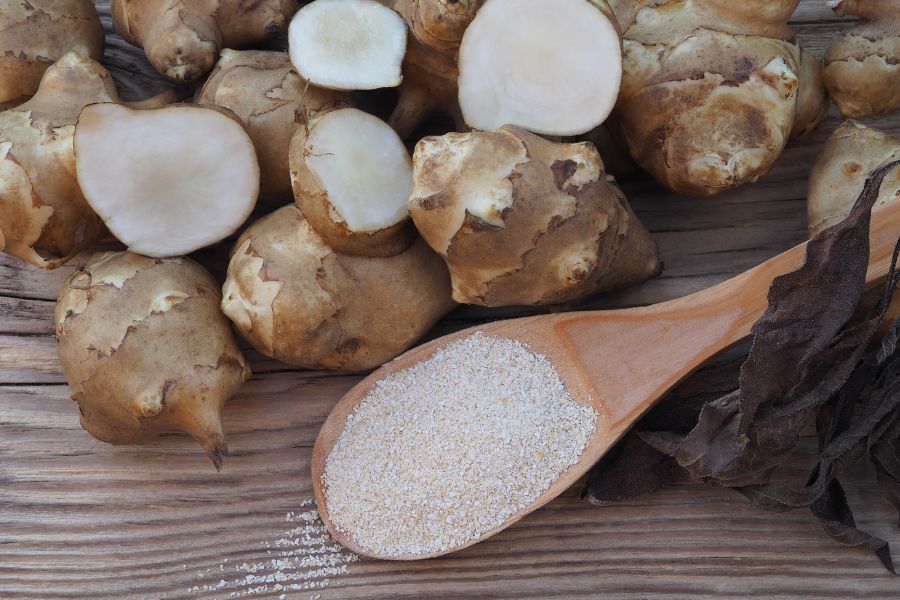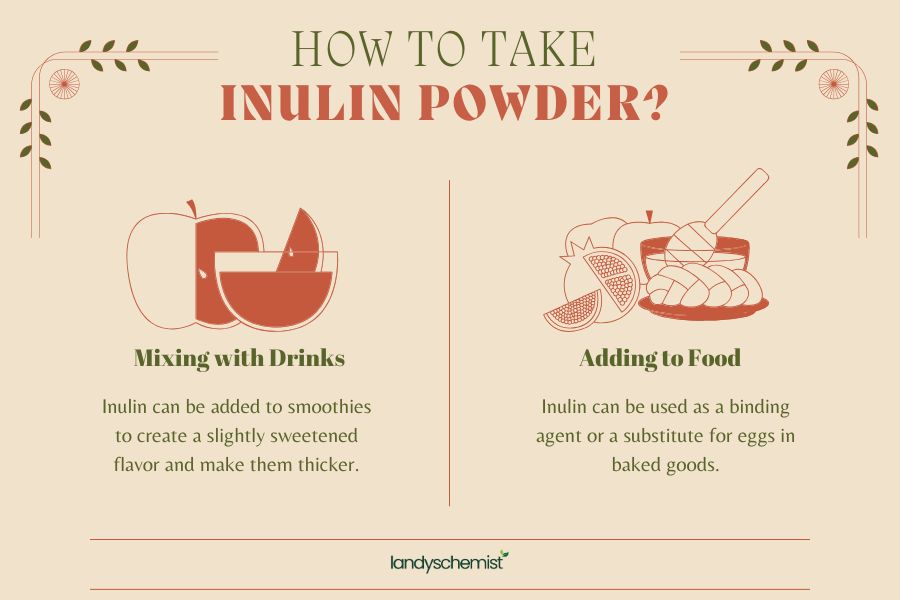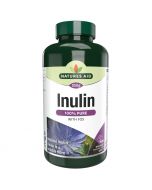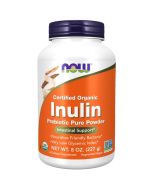
Inulin Powder: Benefits, Uses, Dosage, & Side Effects
What is Inulin?
Inulin powder, a soluble fibre extracted primarily from chicory root, has gained significant attention for its health benefits. As a prebiotic fibre, it isn’t digested in the stomach or small intestine but travels to the large intestine, where it serves as food for beneficial gut bacteria[i]. This unique characteristic makes it highly beneficial for managing blood sugar levels, promoting weight loss, and improving digestive health.
In this blog, we will explore the benefits of inulin powder, how to incorporate it into your diet, its potential side effects, and answers to common questions.

What is Inulin Powder Good For?
Inulin powder offers a range of health benefits, particularly for digestive health, weight management, and blood sugar control. Here's a look at how inulin powder can support your overall health:
Diabetes Control
As a soluble fibre, inulin slows the digestion of carbohydrates, resulting in a gradual release of glucose into the bloodstream[ii]. This can help prevent sudden spikes in blood sugar after meals and improve insulin sensitivity, making it a useful addition to a diabetes management plan. Research has also shown that inulin, along with fructooligosaccharides (FOS), can help improve glycaemic control in individuals with type 2 diabetes[iii].
Improving Digestive Health
Inulin powder is a well-known prebiotic supplement that supports the growth of beneficial gut bacteria. A healthy balance of gut microbiota is essential for proper digestion, immune function, and overall well-being. Inulin helps to enhance this balance by nourishing the beneficial bacteria, improving digestion, and reducing symptoms such as bloating and constipation. It may also promote regular bowel movements and alleviate the discomfort associated with poor digestion[iv].
Weight Management
One of the benefits of inulin powder for weight management is its ability to promote feelings of fullness. As a fibre, inulin absorbs water in the stomach, expanding to form a gel-like substance that slows down digestion and delays hunger[v]. This can help reduce overall calorie intake, support appetite regulation, and prevent overeating. Regular intake of inulin has been associated with a reduction in body fat percentage and improved weight management outcomes[vi].
How to Take Inulin Powder?
Inulin powder is highly versatile and can be incorporated into your daily routine in a variety of ways. Here are some popular methods for taking inulin powder:
Mixing with Drinks
One of the easiest ways to consume inulin powder is by mixing it into your drinks. You can stir it into water, smoothies, or juices. Due to its mild taste, inulin doesn't overpower the flavour of the drink, making it an easy addition to your morning or post-workout beverage. Try adding it to your morning smoothie along with other fibre-rich fruits and vegetables for an extra health boost.
Adding to Food
Inulin powder can also be added to food for a subtle increase in fibre content. It can be mixed into oatmeal, yoghurt, or porridge, or even used in baking. Inulin can help add a slight sweetness to your dishes, making it a great addition to healthy snacks or desserts like energy balls or baked goods. Be sure to incorporate it gradually into your meals to allow your digestive system to adjust.
Recommended Dosage
The recommended dosage of inulin powder typically ranges from 5 to 10 grams per day[vii]. However, it’s essential to start with a lower dose and gradually increase it over time to allow your body to adapt, as too much inulin too quickly may lead to digestive discomfort. If you're using it as a prebiotic supplement for gut health or diabetes control, consult with a healthcare provider for personalised advice.

Possible Side Effects of Inulin Powder
While inulin powder is generally safe to consume, it can cause some digestive side effects, especially if taken in large amounts. Some of the most common inulin side effects include:
- Bloating and Gas: Because inulin is a type of soluble fibre, it can be fermented by bacteria in the gut, which produces gas. This can lead to bloating, particularly if your body isn’t accustomed to high-fibre foods. It is recommended to start with a small dose and gradually increase the intake to reduce the risk of bloating and discomfort.
- Stomach Cramps: Inulin’s fermentation process can also cause mild stomach cramps, especially if you consume too much too quickly[viii]. Again, a gradual increase in dosage can help prevent this issue.
- Diarrhoea: In some cases, high doses of inulin may lead to diarrhoea due to its effect on water retention in the intestines. If you experience loose stools, reduce your dosage and gradually build up to the recommended amount.
- Possible Allergic Reactions: Although rare, some individuals may be allergic to inulin, especially if it’s derived from chicory root. Symptoms of an allergic reaction could include itching, swelling, or difficulty breathing[ix]. If you experience these symptoms, discontinue use immediately and consult a healthcare professional.
Is Inulin Dangerous?
Inulin is generally considered safe for most people when taken in appropriate amounts. However, excessive intake or sudden increases in fibre can lead to digestive discomfort, including bloating, gas, and diarrhoea. If you have a sensitive digestive system or conditions like irritable bowel syndrome (IBS), you may want to consult a healthcare provider before adding inulin powder to your diet. To learn more about natural sources of inulin, read out blog here.
FAQ
How much inulin should I take for weight loss?
For weight loss, it’s generally recommended to start with 5 grams of inulin powder per day, gradually increasing the dosage as your body becomes accustomed to the fibre. This amount can help promote feelings of fullness and assist with appetite control. However, it should be used as part of a balanced diet and healthy lifestyle[x].
Can inulin powder help with sleep?
Inulin powder may support sleep indirectly by promoting gut health. Research has shown that a healthy gut microbiome can influence sleep patterns and overall mood. However, inulin is not specifically used as a sleep aid.
How does inulin help with bloating?
Inulin powder can help reduce bloating by promoting healthy digestion and supporting the growth of beneficial gut bacteria. It helps regulate bowel movements and reduce constipation, which can alleviate bloating.
What is the difference between inulin and FOS?
Inulin and FOS (fructooligosaccharides) are both prebiotics, meaning they support the growth of healthy gut bacteria. While both are derived from plants and have similar health benefits, inulin is a longer-chain carbohydrate, and FOS is typically shorter[xi]. Both fibres can be used to improve gut health, but inulin is often considered gentler on the stomach.
Can inulin powder cause gas?
Yes, inulin powder can lead to gas, particularly if consumed in large amounts or too quickly. Since inulin is fermented by gut bacteria, this process produces gas. To reduce gas and bloating, it's recommended to start with a small amount and gradually increase your dosage.
[i] https://pmc.ncbi.nlm.nih.gov/articles/PMC3705355/
[ii] https://pmc.ncbi.nlm.nih.gov/articles/PMC3257631/
[iii] https://pmc.ncbi.nlm.nih.gov/articles/PMC3638225/
[iv] https://pmc.ncbi.nlm.nih.gov/articles/PMC10449545/
[v] https://pmc.ncbi.nlm.nih.gov/articles/PMC9268622/
[vi] https://pubmed.ncbi.nlm.nih.gov/39313030/
[vii] https://pubmed.ncbi.nlm.nih.gov/10395609/
[viii] https://pmc.ncbi.nlm.nih.gov/articles/PMC10449545/
[ix] https://synapse.patsnap.com/article/what-are-the-side-effects-of-inulin
[x] https://pmc.ncbi.nlm.nih.gov/articles/PMC4619305/
[xi] https://pmc.ncbi.nlm.nih.gov/articles/PMC6463098/









